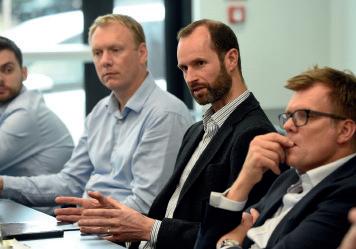
3 minute read
THE GREATEST CHALLENGE FOR LIFE SCIENCES COMPANIES IN THE UK IS FINDING SKILLED PEOPLE
Are they engaged in what they are doing? Is this a great place to work? We’re making sure that our team can say yes to these questions.”
A growing problem for Oxfordshire is the cost of living, added Ben. “Junior people are not so hard to find but the cost of living in Oxfordshire makes it difficult for them to relocate here. Remote working has been transformative for us all, but companies want people back in the labs and we’re going to need to find creative, sustainable solutions to this challenge in the near future.”
Making the work environment attractive to entice staff back to the office will also help attract new people.
Having a large cluster of life sciences companies can help, said Deborah. “If you live and work in Scotland and lose your job, you’re likely to have to relocate your whole family. In London, Oxford and Cambridge if you move company, it’s less likely you will need to move your family.”
The life sciences sector is facing a skills shortage, particularly in digital, data and engineering. Brexit hasn’t helped as European scientists are staying at home until the employment landscape in the UK is clearer for them.

It is estimated that 133,000 extra life sciences jobs will need to be filled by 2030 in the UK alone.
Deborah Spencer at the University of Oxford said: “The university has been losing experienced people who are moving into industry where the pay is often better. But we need skilled people for our quantum drug discovery programme. I need a computational chemist who can work on small molecules or antibodies to look at where quantum can help.”
But is the university a victim of its own success? asked Philip Campbell of Milton Park. “The university has successfully spun out companies which itself will generate an increased need for skills.”
Vaccitech had a challenging few months to fill two senior manufacturing roles. “Before Brexit around 70 per cent of applications for those roles would have come from Europe,” said Graham Gri ths. “Now that’s maybe 10 per cent. It’s as though you have a whole army of skilled people reluctant to relocate to the UK, perhaps because they don’t know what that means for them in the long term. We should do what we can to attract these people.”
But this isn’t just a UK problem according to Ben Thomas at Oxford BioTherapeutics.
“There is a big shortage of senior skilled people everywhere, including in San Jose, USA, where we also have a base. Biotech is incredibly competitive.”
Company culture plays a big part in recruitment and retention, Ben added. “Is the work interesting to our employees?
Adam Stoten at Evotec, which employs more than 800 people at Milton Park, agrees. “The key is to have a more holistic view of all the infrastructure needed to support the life sciences ecosystem. We are taking on large numbers of new employees each year to support our growth and are recruiting globally for the people we need. Yes, some of the political changes over the last few years have made that more challenging, but we want to bring people, particularly those early in their careers, into an ecosystem where they can find somewhere to live which isn’t miles away. There does have to be the investment in infrastructure to support that and if that isn’t forthcoming, companies will go elsewhere.”
So what makes a company sticky to its employees?
Having interesting and challenging projects will attract staff, making people feel they have ownership and feel a sense of achievement. Apprenticeship schemes can help plug gaps, investment in infrastructure helps with growth and affordable housing attracts graduates.
Michalis Papadakis at Brainomix added: “We are all fortunate to have a clear purpose and value that everyone can subscribe to. It’s about giving ownership, having clear empowerment. Being part of an innovative company and having trust in your team.”
It’s also about ensuring that at whatever stage your company is at, your skilled people continue to be challenged intellectually, according to Keith Errey at Isansys. “When employing really smart people, give them the best problems to solve and they’ll stay.”
Adam said: “It’s a shared sense of purpose that makes them get out of bed in the morning. We are all fortunate in this industry that the mission is very clear for all of us. We have tried to ensure at Evotec that as we have grown there is a collective sense of ownership and understanding of what goes on across the company.”



